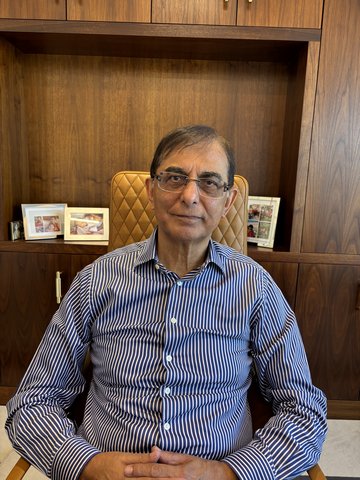
Bhikhu Patel
Bhikhu Patel was born in 1947, Kenya, and with his brother Vijay Patel founded the global pharmaceutical company Waymade Healthcare
Part of the South Asian Britain oral history collection
About
Born in Kenya, Bhikhu Patel moved to the UK to join his sister, later studying architecture at Bristol University. He describes his time at the university positively and talks of a passion for architecture. Having worked in the field, Bhikhu later shifted careers, leaving architecture to purchase two retail newsagents in 1978, seeking financial security for his family. Despite facing challenges, he later co-founded Waymade Healthcare with his brother Vijay Patel, expanding the company considerably and buying a warehouse in Basildon. A proud British Asian, Bhikhu credits their Gujarati heritage and mother’s philanthropic values for their success. Among many other awards, Bhikhu received the Entrepreneur of the Year award in 2001 with his brother, and they remain committed to charitable work in India and Africa through the Shanta Foundation. Bhikhu describes his family values, mentioning his children and grandchildren, as well as their professional futures.
The full interviews recorded for 'Remaking Britain', for the South Asian Britain: Connecting Histories digital resource, are available at the British Library under collection reference C2047.
Listen to Bhikhu talking about his education in Kenya.
Interview conducted by Maya Parmar, 26 March 2024.
BP: So made a plan to come here. So ‘65 I worked there [Kenya], I came across to the UK in ‘66.
MP: With your British citizenship?
BP: Yeah, British citizenship, my passport wasn’t even marked. Interesting through all of this is, always been British all my life. I learnt the national anthem at the age of 10. You know, we were taught all the British history, British constitution, what a parish council was here, council was here, who was an alderman, and yet nothing was taught about Africa and local history, apart from the fact that how the British and the Portuguese came across to go to India.
MP: So you describe that now – back then did it seem strange that there was no African history? Or even Indian history?
BP: Yep, looking back, yes. And interestingly, they even touched a little on the British role in Kenya, and in India and in East Africa. And about Livingstone the explorer, Stanley etc., but that’s where it stopped. There was no kind of history going back 100 years, and about how the community...about slavery, for instance. Slavery was prominent in West Africa. It was still predominant in East Africa, with slaves going across to mostly Saudi Arabia, and that sort of area, but no mention of that, no. But it does feel very strange now. And therefore, when you came across here to understand the politics, to understand Downing Street, to understand different unwritten constitution, the role of the monarchy, it was all understood by me and given. Because you’re brought up with that. And I think sometimes obviously you don’t expect people in this country to know that. It is totally under-appreciated by everyone. How British we were in in our upbringing, in our culture. etc. Everything in the medium of communication was English there, and it worked very well for the colony, but equally when I came across here, there was not an issue where the language was concerned. You know.
All audio and video clips and their transcriptions are excluded from creative commons licensing. This material cannot be reused or published elsewhere without prior agreement. Please address any permissions requests to: remaking-britain-project@bristol.ac.uk
